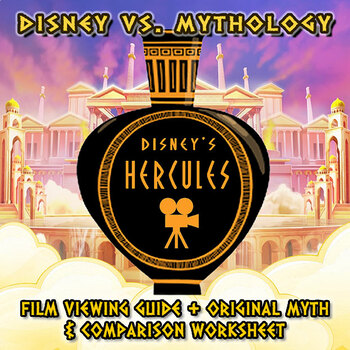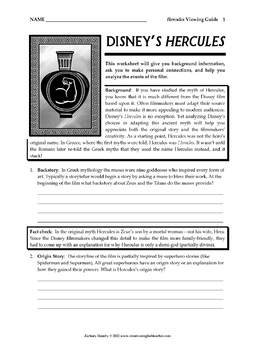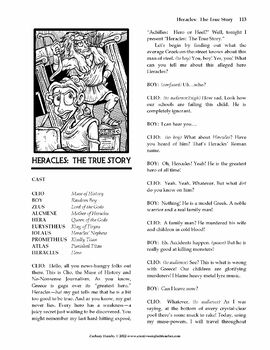Disney's Hercules Viewing Guide + Original Myth and Comparison Worksheet
Zachary Hamby
486 Followers
Grade Levels
6th - 12th, Homeschool
Subjects
Resource Type
Standards
CCSSRL.9-10.7
Formats Included
- PDF
Pages
29 pages
Zachary Hamby
486 Followers
Description
Have you ever wondered how the Disney film version of Hercules stacks up against real mythology? This collection of activities gives students a chance to view the Disney film, read the original myth (through a Reader's Theater script-story), and compare the two!
Often filmmakers must adapt their source material to make it more appealing to modern audiences, and Disney’s Hercules is no exception. Analyzing Disney’s choices in adapting this ancient myth will help you appreciate both the original story and the filmmakers’ creativity. The viewing guide for Disney's Hercules gives interesting background information, trivia, mythology to film "fact checks," and asks relevant analysis questions.
Included in this download are the following items:
- An 8-page Disney's Hercules viewing guide with background, trivia, and analysis questions. Students answer 15 short answer questions as they view the film. A key is also included!
- A 13-page Reader's Theaters script-story "Heracles: The True Story." This script-story re-tells the Greek myth of Heracles. Note: This script-story is excerpted from Reaching Olympus: Tales of Titans, Gods, and Mortals
- A film and myth comparison worksheet where side-by-side comparisons can be made (key included)
Total Pages
29 pages
Answer Key
Included
Teaching Duration
3 days
Report this resource to TPT
Reported resources will be reviewed by our team. Report this resource to let us know if this resource violates TPT’s content guidelines.
Standards
to see state-specific standards (only available in the US).
CCSSRL.9-10.7
Analyze the representation of a subject or a key scene in two different artistic mediums, including what is emphasized or absent in each treatment (e.g., Auden’s “Musée des Beaux Arts” and Breughel’s Landscape with the Fall of Icarus).




